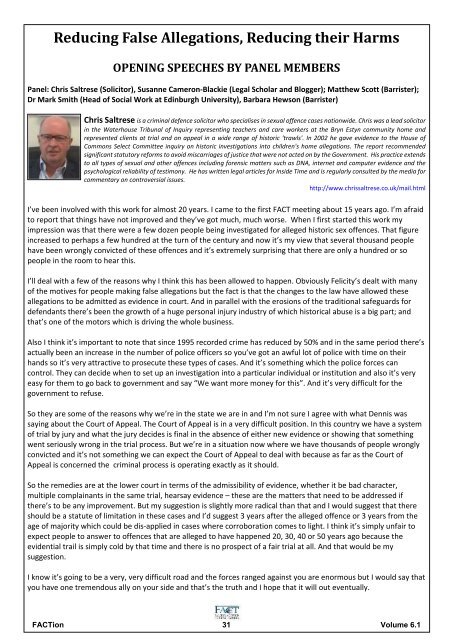FACTion-6.1-web-version
FACTion-6.1-web-version
FACTion-6.1-web-version
You also want an ePaper? Increase the reach of your titles
YUMPU automatically turns print PDFs into web optimized ePapers that Google loves.
Reducing False Allegations, Reducing their HarmsOPENING SPEECHES BY PANEL MEMBERSPanel: Chris Saltrese (Solicitor), Susanne Cameron-Blackie (Legal Scholar and Blogger); Matthew Scott (Barrister);Dr Mark Smith (Head of Social Work at Edinburgh University), Barbara Hewson (Barrister)Chris Saltrese is a criminal defence solicitor who specialises in sexual offence cases nationwide. Chris was a lead solicitorin the Waterhouse Tribunal of Inquiry representing teachers and care workers at the Bryn Estyn community home andrepresented clients at trial and on appeal in a wide range of historic 'trawls'. In 2002 he gave evidence to the House ofCommons Select Committee inquiry on historic investigations into children's home allegations. The report recommendedsignificant statutory reforms to avoid miscarriages of justice that were not acted on by the Government. His practice extendsto all types of sexual and other offences including forensic matters such as DNA, internet and computer evidence and thepsychological reliability of testimony. He has written legal articles for Inside Time and is regularly consulted by the media forcommentary on controversial issues.http://www.chrissaltrese.co.uk/mail.htmlI’ve been involved with this work for almost 20 years. I came to the first FACT meeting about 15 years ago. I’m afraidto report that things have not improved and they’ve got much, much worse. When I first started this work myimpression was that there were a few dozen people being investigated for alleged historic sex offences. That figureincreased to perhaps a few hundred at the turn of the century and now it’s my view that several thousand peoplehave been wrongly convicted of these offences and it’s extremely surprising that there are only a hundred or sopeople in the room to hear this.I’ll deal with a few of the reasons why I think this has been allowed to happen. Obviously Felicity’s dealt with manyof the motives for people making false allegations but the fact is that the changes to the law have allowed theseallegations to be admitted as evidence in court. And in parallel with the erosions of the traditional safeguards fordefendants there’s been the growth of a huge personal injury industry of which historical abuse is a big part; andthat’s one of the motors which is driving the whole business.Also I think it’s important to note that since 1995 recorded crime has reduced by 50% and in the same period there’sactually been an increase in the number of police officers so you’ve got an awful lot of police with time on theirhands so it’s very attractive to prosecute these types of cases. And it’s something which the police forces cancontrol. They can decide when to set up an investigation into a particular individual or institution and also it’s veryeasy for them to go back to government and say “We want more money for this”. And it’s very difficult for thegovernment to refuse.So they are some of the reasons why we’re in the state we are in and I’m not sure I agree with what Dennis wassaying about the Court of Appeal. The Court of Appeal is in a very difficult position. In this country we have a systemof trial by jury and what the jury decides is final in the absence of either new evidence or showing that somethingwent seriously wrong in the trial process. But we’re in a situation now where we have thousands of people wronglyconvicted and it’s not something we can expect the Court of Appeal to deal with because as far as the Court ofAppeal is concerned the criminal process is operating exactly as it should.So the remedies are at the lower court in terms of the admissibility of evidence, whether it be bad character,multiple complainants in the same trial, hearsay evidence – these are the matters that need to be addressed ifthere’s to be any improvement. But my suggestion is slightly more radical than that and I would suggest that thereshould be a statute of limitation in these cases and I’d suggest 3 years after the alleged offence or 3 years from theage of majority which could be dis-applied in cases where corroboration comes to light. I think it’s simply unfair toexpect people to answer to offences that are alleged to have happened 20, 30, 40 or 50 years ago because theevidential trail is simply cold by that time and there is no prospect of a fair trial at all. And that would be mysuggestion.I know it’s going to be a very, very difficult road and the forces ranged against you are enormous but I would say thatyou have one tremendous ally on your side and that’s the truth and I hope that it will out eventually.<strong>FACTion</strong> 31 Volume <strong>6.1</strong>


